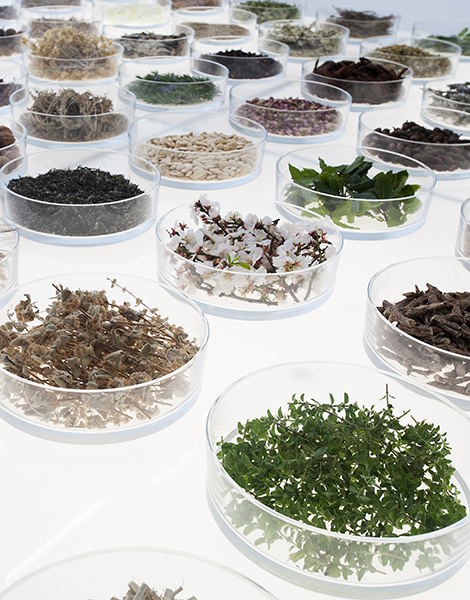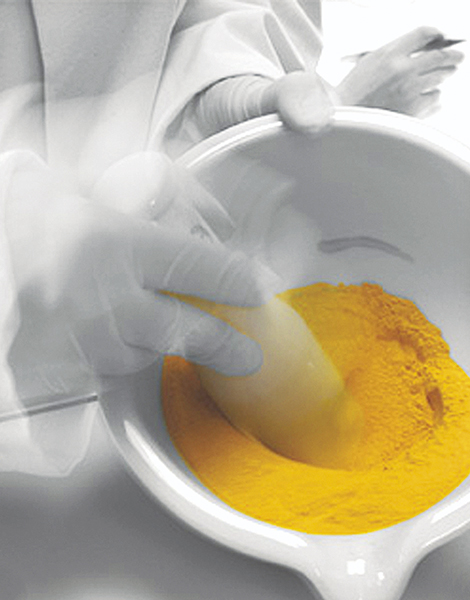In the quiet of the mid-afternoon, on a steep hillside overlooking the deep blue sea, honey bees stir the wild sage, oregano and thyme, releasing the fragile woody aroma of the Greek scrubland, or phrygana. In a state-of-the-art laboratory just outside Athens known as the “hive,” teams of researchers – pharmacologists, cosmetologists, biochemists and chemical engineers – work to extract and test natural ingredients from Greek plants for a new generation of natural products.
Greece has a rich natural herbarium and a long tradition of extracting value from it, making, as the food writer Patience Gray put it, “honey from a weed.” Today, a small ecosystem of dynamic Greek companies has emerged whose strength and identity comes from combining the country’s unique botanical resources with its rich traditions and strong science base to produce luxury cosmetics and nutritional supplements. Cosmetics brands such as Apivita and Korres have leveraged their knowledge of traditional herbal remedies to create globally recognized personal care brands. At the same time, companies such as Power Health are becoming known for their natural dietary supplements and over-the-counter remedies based on plant extracts. A whole host of smaller Greek startups are emerging in the natural products sector, both in production and in e-commerce, benefiting from the natural advantages offered by Greece.

As modern as these companies are in their approach, they are in fact the inheritors of a millennia-old tradition. In Classical Greece, the natural environmental diversity came under scrutiny by the first philosophers, resulting in the earliest systematic studies of plants and their properties. In the 5th c. BC, Hippocrates and his students laid the foundations for scientific medicine, while Theophrastus, a student of Plato and Aristotle, pioneered the field of botany with the first-ever classification of plants. While working for the Roman army, a Greek doctor named Pedanius Dioscorides compiled the definitive “pharmacopeia,” De Materia Medica, which became the primary medical reference book through the Middle Ages. In the 18th c., John Sibthorp, a professor of botany at Oxford, set out with a copy of De Materia Medica in his luggage to catalogue Europe’s “last unexplored plants.” The resulting work, a luxuriously illustrated work titled Flora Graeca, was recently exhibited in the Gennadius Library in Athens. It recorded 2,500 medicinal plants, of which 700 were classified for the first time. Throughout this time, nameless traditional herbalists (many of them undoubtedly women) developed and passed down home remedies using the wild plants around them. The new generation of Greek herbalists gives credit to both these traditions, the formal and the informal, in shaping their methods and ingredients.

BEAUTY OUTSIDE
Apivita, whose name means “life of the bee,” was founded in 1979 by two young pharmacists with a passion for beekeeping, Greek nature and the Hippocratic holistic approach to health and healing. Their product range, which started with natural soaps, now includes face, hair and body care products, combining ingredients such as red wine, royal jelly and propolis, or bee glue, with herbal extracts. “When we decided to expand from the pharmacy business, it was a time when no one believed in natural cosmetics, and no one bought Greek products, let alone Greek cosmetics, but in the craziness of our youth we saw an opportunity,” says Niki Koutsiana, Apivita’s President and co-founder. “In reality, we have never sold the products themselves, but the vision, the ideas; our mission was to spread the teachings of Hippocrates, to ‘pollinate’ the world with his ideas like bees.” Indeed, one of the company’s flagship initiatives has been the Hippocrates botanical garden, an homage to the “father of medicine” on his ancestral island of Kos.
Apivita sources its ingredients from small producers across the country. Their distinctive logo, a modern graphical representation of the “Mallia bees,” a Minoan pendant depicting a pair of facing bees, reflects the combination of ancient and modern in their approach. The bee provides a discreet motif around their headquarters, itself housed in a purpose-built bioclimatic “hive” complex. In their research and development laboratories, Apivita’s team have used state-of-the-art techniques to develop over a hundred proprietary extracts and oils from a few dozen plants and beekeeping products. Their biochemical lab holds a library of over 200 genes associated with skin conditions in order to study the efficacy of their raw materials. In addition to selling from its own stores and pharmacies in Greece, Apivita has chosen to pursue an outward-facing strategy, with activities in 15 countries across Europe and Asia. Today, the overseas markets account for up to a third of their sales.


It seems that the world is indeed coming around to the Hippocratic approach. As consumers worldwide become more conscious of the ingredients in their cosmetics, they are seeking out greener and safer choices. A growing segment of the market is demanding natural and sustainable materials with organic certification, and avoiding synthetic substances and petroleum-based products. It is a desire that marries health-consciousness with a concern for the natural environment. According to a recent study, this trend is driving growth in the global market for organic personal care products at a projected rate of 10 percent every year, meaning it should reach almost $16 billion in value by 2020. In this market, small specialist independent brands are able to play a major part based on their ability to develop innovative, market-leading products.
Another pioneer of the “green” philosophy in Greece has also been riding this global tide to great acclaim. The seeds of the Korres brand were sown when its founder, a pharmacology graduate, went to work in Athens’s first homeopathic pharmacy in 1989. Combining the scientific method and the homeopathic approach, he ended up taking over the business and launching the Korres brand in 1996. Korres has a simple philosophy: high-quality natural and/or organic ingredients, clinically tested for efficacy, at affordable prices.

The products are sold in airports, Korres stores, luxury outlets and pharmacies worldwide. Their branding is instantly recognizable (they have won awards for their packaging as well as for their products): bold modern typeface, combined with retro images in striking color-coded blocks. The original Korres pharmacy had over 3,000 herbal remedies in its stock, and the company continues to research unusual ingredients. Their fig-scented body-care range and wild rose facial products are perennial favorites, while their latest lines of anti-ageing creams, based on Black Pine and Castanea Arcadia (Arcadian Chestnut), were produced in collaboration with the University of Athens and a number of research centers worldwide. What’s more, their business practices are as “green” as their products; sourcing raw materials from local producers and cooperatives, banning animal testing throughout the development chain, avoiding mineral oils, minimizing waste and conserving resources are all integral parts of the Korres philosophy.
“During our 20-year journey, we have been focusing on Greek herbs, on our cooperation with farmers around Greece, on promoting scientific research in relation to skin biochemistry, on producing brand-owned premium organic extracts and on developing innovative products,” says the company’s founder and president George Korres. “The network of ethical cooperation we have developed with farmers supports around 5,000 families; the choice not to cultivate ourselves the herbs that we need is a conscious one. Our aim isn’t to compete, but to support the farmers and their unions, as well as the local communities. This is an essential part of our effort to take valuable Greek herbs around the world through outstanding new products of unique quality that hopefully inspire and make people happy.” Korres has a presence in 30 countries; the brand has established a strong footprint in the USA and Europe, and is now expanding in Latin America through a strategic agreement with Avon.


HEALTH INSIDE
Athens-based Power Health started manufacturing natural supplements in 1984, with the twin goals of encouraging preventative healthcare and offering a more natural alternative to prescription medications for treating mild health complaints. Power Health founder and Managing Director Lilly Perganta, who describes herself as a “romantic chemist,” is effusive about the potential of Greek herbal supplements: “For 33 years, our vision has remained steadfast and focused on making consumers’ lives healthier and happier through the unique benefits that Greek nature provides us. We believe that a ‘green’, or environmental, logic is more timely today, and more necessary for our body and soul, than ever. We are constantly raising the bar for health food supplements ahead of consumer trends, creating added value through innovation, professionalism and quality.” The company has a strong presence in Cyprus and the Balkans; it exports throughout Europe (where it has won numerous awards) and sees the Gulf countries as its next area of growth.
The same concerns that lead people to seek out natural cosmetics are also driving an increase in the demand for natural food supplements and herbal remedies. Consumers around the world are becoming more aware of the beneficial effects of a healthy diet, and are searching for ways to boost their intake of micronutrients and vitamins. They are also increasingly conscious of the dangers of over-medication for long-term health. According to market research, the global market for supplements, valued at $108 million in 2013, is expected to grow by 7.4 percent annually and reach almost $180 million by 2020.

More Greek companies are seeing their competitive advantage and seizing the opportunity. A dynamic new entrant to the natural supplements market is SUPERFOODSTM, which has been active since 2003 but only began developing its own proprietary products in 2008. It is best known for a suite of supplements based on sea buckthorn (hippophae), a berry noted for its beneficial properties since Classical times, and whose revival the company has been encouraging in Greece. Having established a firm footing in the domestic market, they are planning to take the brand global in the next year.
This is not small-time. Both natural cosmetics and supplements manufacturers benefit from strong synergies with more established business sectors in Greece. The conventional pharmaceutical industry is the unsung hero of the Greek manufacturing sector. The industry anchors a skilled workforce numbering several thousand employed in R&D and manufacturing.
There’s a further, very modern, trend that has been helping Greek manufacturers of natural products to expand: the growth of e-commerce. With more consumers buying personal care products on the internet, online pharmacies such as www.greekpharma.com and www.olivegarden.gr are offering a digital shop window to the world for Greek products.










